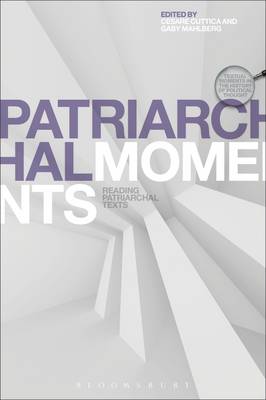16%OFF

Stock image for illustration purposes only - book cover, edition or condition may vary.
Patriarchal Moments: Reading Patriarchal Texts
Cesare Cuttica
€ 36.99
€ 31.25
FREE Delivery in Ireland
Description for Patriarchal Moments: Reading Patriarchal Texts
Paperback. Series: Textual Moments in the History of Political Thought. Num Pages: 232 pages. BIC Classification: HPS; JPA; JPF. Category: (U) Tertiary Education (US: College). Dimension: 234 x 156. Weight in Grams: 401.
Patriarchalism is omnipresent in Western culture and it pervades the texts that have shaped this culture. From the creation story in the Bible to the ancient authors, from the Church fathers to the treatises of Enlightenment philosophers, right up to modern fiction, male authority over women, children and other dependents has shaped the nature of human relationships and the discourses about these relationships. This collection of short essays offers fresh and novel readings of key texts in the history of patriarchalism as a concept of power. The texts selected are from political, religious and literary works and together the readings add new insights to a tradition that has never gone uncontested, yet is unlikely to disappear soon.
Product Details
Publisher
Bloomsbury Publishing PLC United Kingdom
Number of pages
232
Format
Paperback
Publication date
2015
Series
Textual Moments in the History of Political Thought
Condition
New
Number of Pages
232
Place of Publication
London, United Kingdom
ISBN
9781472589156
SKU
V9781472589156
Shipping Time
Usually ships in 5 to 9 working days
Ref
99-1
About Cesare Cuttica
Cesare Cuttica is Lecturer in British History at the University of Paris 8-Vincennes, France. Gaby Mahlberg is an independent scholar based in Berlin, Germany.
Reviews for Patriarchal Moments: Reading Patriarchal Texts
[This] volume should prove to be a useful and well-priced addition to any undergraduate course dealing with the contours of patriarchal power in the western world. The passages chosen are all relevant and interesting, and student readers will find the short essays lively and easily digestible.
Bryn Mawr Classical Review
This excellent, wide-ranging collection of essays by leading experts is a key starting point (and a mine of information) for anyone with an interest in ideas about the links between families and states, and between patriarchal and political authority. It discusses patriarchal power in the political thought of the ancient and modern worlds - beginning with the bible, the Talmud, and the Qur'an, and ending with Angela Carter. There is especially detailed discussion of European ideas of the seventeenth and eighteenth centuries. This is a lucidly expressed, entertaining and instructive collection, based on the latest scholarship in a number of disciplines.
Johann Sommerville, University of Wisconsin-Madison, USA
The sharp, nuanced and often witty essays in this volume cast a fresh light on the patriarchalist tradition, showing it to be nimble and plastic, far more complex and contradictory than we have imagined. With its chronological breadth and interdisciplinary perspective, Patriarchal Moments will be welcomed by students, by teachers, and by any reader wondering why the notion that men should rule women, wives and children has persisted in so forms over so many centuries.
Rachel Weil, Cornell University, USA
Patriarchal Moments invites us to read a host of classic texts - religious and literary, philosophical and political - in the company of specialists whose perspicacious interpretations probe the tension between normative frameworks and actual social and political practice. With its salutary reminder that patriarchalism is above all a way of understanding social and political order, Patriarchal Moments offers a compelling series of contextualized analyses that explore the different kinds of personalized authority - male over female, father over child, government over families - that constitute the several, interrelated faces of patriarchal power. As such, it invites us to consider the emotional purchase that patriarchal visions of familial and political authority have exercised in both past and present, offering ways to rethink the obstacles that feminists face in their efforts to re-shape both familial and political spheres of life.
Laura Lee Downs, European University Institute, Italy
Bryn Mawr Classical Review
This excellent, wide-ranging collection of essays by leading experts is a key starting point (and a mine of information) for anyone with an interest in ideas about the links between families and states, and between patriarchal and political authority. It discusses patriarchal power in the political thought of the ancient and modern worlds - beginning with the bible, the Talmud, and the Qur'an, and ending with Angela Carter. There is especially detailed discussion of European ideas of the seventeenth and eighteenth centuries. This is a lucidly expressed, entertaining and instructive collection, based on the latest scholarship in a number of disciplines.
Johann Sommerville, University of Wisconsin-Madison, USA
The sharp, nuanced and often witty essays in this volume cast a fresh light on the patriarchalist tradition, showing it to be nimble and plastic, far more complex and contradictory than we have imagined. With its chronological breadth and interdisciplinary perspective, Patriarchal Moments will be welcomed by students, by teachers, and by any reader wondering why the notion that men should rule women, wives and children has persisted in so forms over so many centuries.
Rachel Weil, Cornell University, USA
Patriarchal Moments invites us to read a host of classic texts - religious and literary, philosophical and political - in the company of specialists whose perspicacious interpretations probe the tension between normative frameworks and actual social and political practice. With its salutary reminder that patriarchalism is above all a way of understanding social and political order, Patriarchal Moments offers a compelling series of contextualized analyses that explore the different kinds of personalized authority - male over female, father over child, government over families - that constitute the several, interrelated faces of patriarchal power. As such, it invites us to consider the emotional purchase that patriarchal visions of familial and political authority have exercised in both past and present, offering ways to rethink the obstacles that feminists face in their efforts to re-shape both familial and political spheres of life.
Laura Lee Downs, European University Institute, Italy
